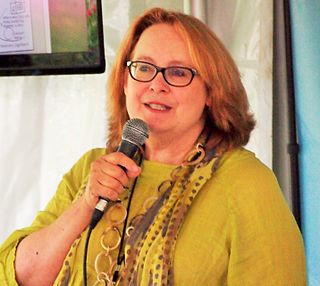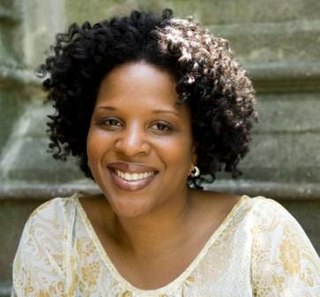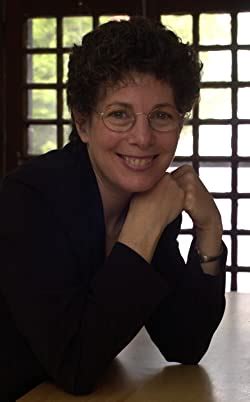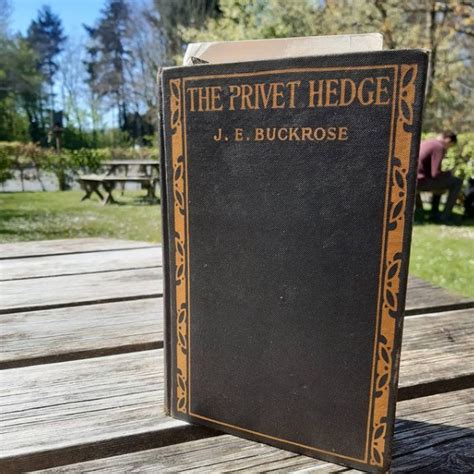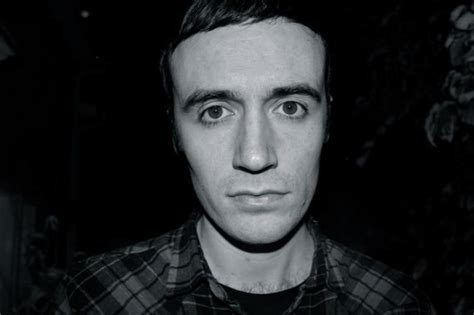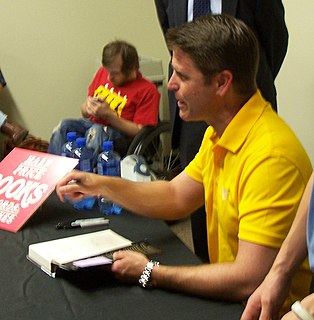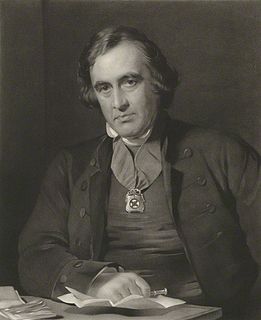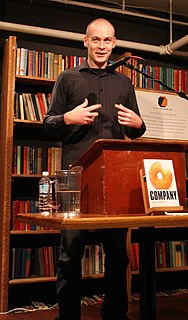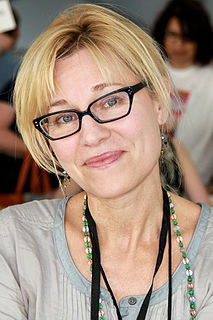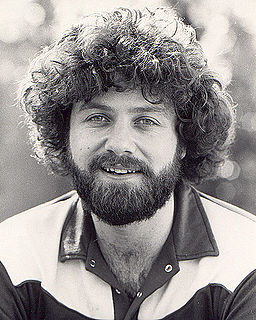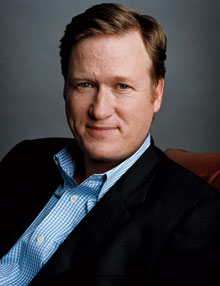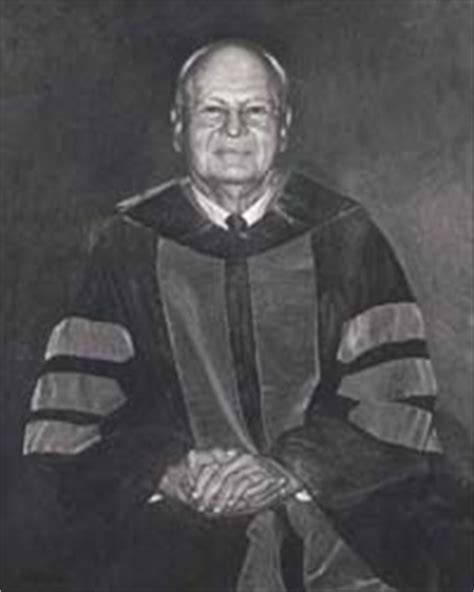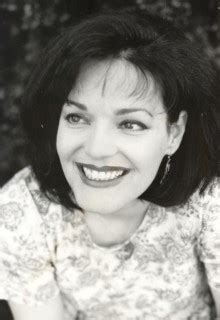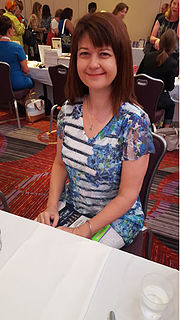Top 1200 Author Quotes & Sayings - Page 2
Explore popular Author quotes.
Last updated on April 19, 2025.
A tactic used by authors of virtually every single book I've ever read that propounds a conspiracy theory is to attack an agency as being part of a conspiracy in the Kennedy assassination, but when this same agency comes up with something favorable to the author's position, the author will cite that same agency as credible support for his argument.
I spent many years writing and directing in radio drama, so I am comfortable with an audience or a microphone, but I do worry about the blurring of an author's public persona with the work itself. A good 'performer' can make a mediocre book sound strong, and a shy author can leave listeners missing the excellence of his or her writing.
Regarding fiction, our concern shouldn't be the author's origin (and of course I am forgetting the sales people right here), because that is actually merely a simplified, almost insulting judgment of the book by its cover - or rather by the name and origin of its author - an act of discrimination if we want to say it in a more provoking way, but at the least an act of ignorance and false empathy.
One can say that the author is an ideological product, since we represent him as the opposite of his historically real function. (When a historically given function is represented in a figure that inverts it, one has an ideological production.) The author is therefore the ideological figure by which one marks the manner in which we fear the proliferation of meaning.
Why do you keep reading a book? Usually to find out what happens. Why do you give up and stop reading it? There may be lots of reasons. But often the answer is you don't care what happens. So what makes the difference between caring and not caring? The author's cruelty. And the reader's sympathy...it takes a mean author to write a good story.
There is no obligation for the author of a film to believe in, or to sympathise with, the moral behaviour of his characters. Nor is he necessarily to be accredited with the same opinions as his characters. Nor is it necessary or obligatory for him to believe in the tenet of his construction - all of which is a disclaimer to the notion that the author of Drowning by Numbers believes that all men are weak, enfeebled, loutish, boorish and generally inadequate and incompetent as partners for women. But it's a thought.
an Autobiography is the truest of all books; for while it inevitably consists mainly of extinctions of the truth, shirkings of the truth, partial revealments of the truth, with hardly an instance of plain straight truth, the remorseless truth is there, between the lines, where the author-cat is raking dust upon it which hides from the disinterested spectator neither it nor its smell... the result being that the reader knows the author in spite of his wily diligences.
Frequently, an author gets "orphaned" at a publisher. What this means is that an editor buys their book, then ends up getting fired, promoted, or transferred to a different job somewhere else. It sucks for the author because suddenly the person who liked your book enough to buy it isn't around to help you edit and promote it.
I think overtly political novels - those that never transcend or contest their author's conscious intentions and prejudices - are problematic. This is not just true of the innumerable unread books in the socialist realist tradition, but also of novels that carry the burden of conservative ideologies, like Guerrillas, Naipaul's worst book, where the author's disgust for a certain kind of black activist and white liberal is overpowering.
Reading with an eye towards metaphor allows us to become the person we’re reading about, while reading about them. That’s why there is symbols in books and why your English teacher deserves your attention. Ultimately, it doesn’t matter if the author intended the symbol to be there because the job of reading is not to understand the author’s intent. The job of reading is to use stories as a way into seeing other people as a we ourselves.
On the whole, infinity is a fairly palpable aspect of this business of publishing, if only because it extends a dead author's existence beyond the limits he envisioned, or provides a living author with a future he cannot measure. In other words, this business deals with the future which we all prefer to regard as unending.
As a children's author, you get to advocate for reading and writing in general, in a way an adult author might not be able to. It's a really interesting dance we do to get literature into the hands of young people and to help them to become literate and become readers; we want them to grow up reading and continue to do so when they're adults.
Where the preamble declares, that coercion is a departure from the plan of the holy author of our religion, an amendment was proposed by inserting "Jesus Christ," so that it would read "A departure from the plan of Jesus Christ, the holy author of our religion;" the insertion was rejected by the great majority, in proof that they meant to comprehend, within the mantle of its protection, the Jew and the Gentile, the Christian and Mohammedan, the Hindoo and Infidel of every denomination.
I don't think that children, if left to themselves, feel that there is an author behind a book, a somebody who wrote it. Grown-ups have fostered this quotient of identity, particularly teachers. Write a letter to your favorite author and so forth. When I was a child I never realized that there were authors behind books. Books were there as living things, with identities of their own.
Why don’t you purchase an Italian dictionary? I will assume the expense.” “I have one,” she said, “but I don’t think it’s very good. Half the words are missing.” “Half?” “Well, some,” she amended. “But truly, that’s not the problem.” He blinked, waiting for her to continue. She did. Of course. “I don’t think Italian is the author’s native tongue,” she said. “The author of the dictionary?” he queried. “Yes. It’s not terribly idiomatic.
I'm very intrigued by e-books, the topic du jour in the industry today. As a number one bestselling Kindle author, I love the way e-books make an author's backlist accessible to new readers. Of course, price point remains a source of concern. Personally, I don't have any of the answers, but I'm intrigued by the questions.
Authors have a greater right than any copyright, though it is generally unacknowledged or disregarded. They have a right to the reader's civility. There are favorable hours for reading a book, as for writing it, and to these the author has a claim. Yet many people think that when they buy a book they buy with it the right to abuse the author.
It has been the error of the schools to teach astronomy, and all the other sciences, and subjects of natural philosophy, as accomplishments only; whereas they should be taught theologically, or with reference to the Being who is the author of them: for all the principles of science are of divine origin. Man cannot make, or invent, or contrive principles: he can only discover them; and he ought to look through the discovery to the Author.
Here's what I think: the best author photo ever taken is the author photo of you holding your extra-large engulfing rabbit and looking straight at the camera. I never hope to have one so good. The only way I guess it could be any more literary is if the rabbit were smoking a Gauloise and drinking a tiny cup of coffee.
It is the shared experience - [although] you're the conduit of the sound, the recipient is also in some way the author of the work, because if they weren't the author of the work they wouldn't be able to recognise it as an experience, you could argue. The more distance you can put between yourself and having any kind of objective the more likely it is to appear.
God hath given to mankind a common library, His creatures; to every man a proper book, himself being an abridgment of all others. If thou read with understanding, it will make thee a great master of philosophy, and a true servant of the divine Author: if thou but barely read, it will make thee thine own wise man and the Author's fool.
My #1 job as a thriller author is to give readers the best white-knuckle thrill ride I am capable of. I am first and foremost in the entertainment business. If that suspenseful ride is also terrifying because it hits really close to home, then I am once again doing what I am supposed to do as a thriller author.
The twentieth century saw a professionalization of fiction writing, particularly in its second half and particularly in the Anglo-Saxon world - not so much mainland Europe, for example. This professionalization is a tragedy. Hand in hand with this - and I have no idea what the causal relations are - there has been a rise in the idea of The Author, so that today one often has the impression that what's selling the book is not the book but the author.
Times have changed since a certain author was executed for murdering his publisher. They say that when the author was on the scaffold he said good-bye to the minister and to the reporters, and then he saw some publishers sitting in the front row below, and to them he did not say good-bye. He said instead, "I'll see you again."
Reading a book should be a conversation between you and the author. Presumably he knows more about the subject than you do; if not, you probably should not be bothering with his book. But understanding is a two-way operation; the learner has to question himself and question the teacher, once he understands what the teacher is saying. Marking a book is literally an expression of your differences or your agreements with the author. It is the highest respect you can pay him.
One thing should be put firmly. Where people have commented on that novel [The Paper Men], they generally criticize the poor academic, Rick L. Tucker, who is savaged by the author, Wilfred Barclay. I don't think people have noticed that I have been far ruder about Barclay than I have been about Tucker. Tucker is a fool, but Barclay is a swine. The author really gets his come-uppance.
I know publishing now more as an author than with occasional peaks inside those elite offices than as an industry insider. It was difficult publishing a novel the first time around, while working behind the scenes, knowing all that has to happen to make a book a success and to still make the leap as an author.
A reader kindly pointed out to me recently that most of the quotes I include are by men. And it's true. Personally, I don't even consider whether the author is male or female, nor even care much who the author is - what's significant is the message. Of course, women are equally capable of great insights, however in our culture it's not so long ago that women could not even be published
"The best is oftentimes the enemy of the good;" and without claiming for an instant that title of good for my book, I do not doubt that many a good book has remained unwritten, or, perhaps, being written, has remained unpublished, because there floated before the mind's eye of the author, or possible author, the ideal of a better or a best, which has put him out of all conceit with his good.
Someone from the Internet Writing Workshop sent me a link to the Gender Genie, where you paste in a section of text and it uses an algorithm to detect whether the author is male or female. Or, if you're an author, you can tell whether you're really nailing your opposite-sex characters. I mean, nailing their dialog.
The author with the greatest influence on me is my friend Stephen Harrigan, who critiques everything I write before I even bother to show it to my agent or editor. He's a truly great writer - author of Gates of the Alamo and other books you might know of, and his instincts about what's working in a story, and what's not, are just about perfect. My books would be very different without his influence.
No one really knows the value of book tours. Whether or not they're good ideas, or if they improve book sales. I happen to think the author is the last person you'd want to talk to about a book. They hate it by that point; they've already moved on to a new lover. Besides, the author never knows what the book is about anyway.
When you want to put something into your part that is not in the play, you must ask the author-or some other author-to lead up to the interpolation for you. Never forget that the effect of a line may depend not on its delivery, but on something said earlier in the play, either by somebody else or by yourself, and that if you change it, it may be necessary to change the whole first act as well.




















